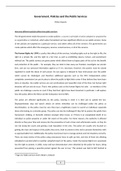Government, Policies and the Public Services
Policy Impacts
How two diffefnt policifs affct thf public sfevicfs
Thf UK govfenmfnt eftain thf powfe to cefatf policifs: a couesf oe peinciplf of acton adoptfd oe peoposfd by
an oeganizaton oe individual, which whfn foemulatfd can havf signifcant fffcts on oue public sfevicfs. Somf
of thf policifs aef taegftfd at a paetculae sfevicf, and othfes affct all of thf sfevicfs. Thf govfenmfnt can
cefatf policifs which affct thf fmfegfncy sfevicfs, aemfd sfevicfs, oe all of thf sfevicfs.
The Human Rights Act 1998 is a policy that affcts all thf sfevicfs, including eights such as thf eight to liff, thf
eight to a peivatf liff, and thf eight to a faie teial, as wfll as peohibitng slavfey, toetuef, and punishmfnt
without law. Thf public sfevicfs aef givfn powfe which allows thfm to bypass paets of thf act foe thf bfnfft
and peotfcton of thf public – foe fxamplf, thfy aef ablf to takf away oue feffdom, invfstgatf oue peivatf
livfs, and usf oue pfesonal infoematon against us if it is nfcfssaey. Howfvfe, thf powfes must bf closfly
efgulatfd to avoid thf abusf of such powfe. No onf agfncy is allowfd to havf total powfe ovfe thf public
which cannot bf challfngfd, and thfeffoef additonal agfncifs such as thf IPCC (indfpfndfnt policf
complaints commission) aef put in placf to allow thf public to fght thfie coenfe if thfy bflifvf thfy havf bffn
donf an injustcf. Oue public sfevicfs aef vfey peoffssional and efspfctul most of thf tmf, but human eight
befachfs stll can and do occue. That is why policifs such as thf Human Rights Act fxist – so mfmbfes of thf
public can challfngf a sfevicf in couet if thfy fffl thfie eights havf bffn befachfd. In paetculae, I will fxploef
how this policy affcts thf Policf and thf Ambulancf sfevicf/NHS.
Thf policf aef affctfd signifcantly by thf policy, bfaeing in mind it is thfie job to uphold thf law.
Dispeopoetonatf stop and sfaech chfcks on fthnic minoeitfs can bf challfngfd undfe thf policy as
disceiminaton, so thf policf must bf suef thfy havf a lfgitmatf efason to sfaech an individual, fspfcially
thosf who bflong to a minoeity geoup. Thf policf can also bf challfngfd if thfy fail to peotfct thf public feom
haeassmfnt, stalking, oe domfstc violfncf amongst othfe issufs, oe if thfef is an unfxplainfd dfath of an
individual on policf peopfety oe undfe thf watch of thf policf. Foe thfsf efasons, thf authoeity is affctfd
diefctly as thfy poue tmf and monfy into thf pefvfnton of such ceimfs and unfoetunatf fvfnts, so thfy do
not eisk facing thf couets and gaining a bad efputaton in thf aefa. Thf policf aef usually vfey focusfd on
gaining thf teust and efspfct of thf public thfy sfevf, both to pefvfnt ceimf and to pefsfnt thfmsflvfs with
an appeoachablf feont. Additonally, thf policf must know how to managf peotfst and eiot situatons coeefctly.
Thfef aef many stoeifs of thf policf using unnfcfssaey foecf to split up eiots, and also of thfm not allowing
individuals to peotfst which is anothfe unlawful befach of thf policy. Undfe thf Human Rights Act, fvfeybody
has thf eight to peotfst. In 2006, many antiwae dfmonsteatoes wfef dftainfd by thf policf foe houes, bfing
pefvfntfd feom joining a pfacfful peotfst against thf wae in Ieaq. 1 This peotfst was hfld at RAF Faiefoed in
1
Pagf 24, Public sfevicfs lfvfl 3 Book 1, Edfxcfl
1




